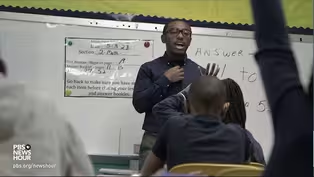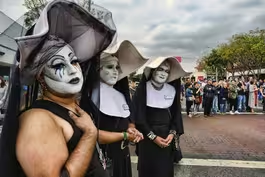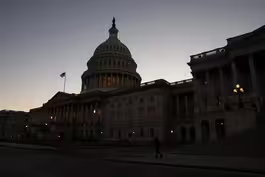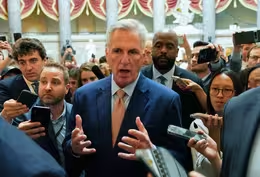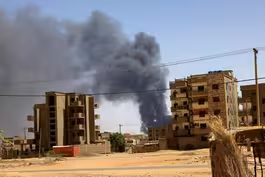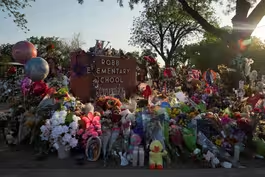
The human toll of the battle for Bakhmut in eastern Ukraine
Clip: 5/23/2023 | 3m 46sVideo has Closed Captions
The human toll of the battle for Bakhmut in eastern Ukraine
Russia claims it has won the battle for Bakhmut, but the fighting continues as it has for more than nine months. Both sides have taken massive casualties to control the strategically marginal city in Ukraine's east. John Ray of Independent Television News has a rare look at one of Ukraine's military field hospitals and its efforts to save lives shattered by war.
Problems playing video? | Closed Captioning Feedback
Problems playing video? | Closed Captioning Feedback
Major corporate funding for the PBS News Hour is provided by BDO, BNSF, Consumer Cellular, American Cruise Lines, and Raymond James. Funding for the PBS NewsHour Weekend is provided by...

The human toll of the battle for Bakhmut in eastern Ukraine
Clip: 5/23/2023 | 3m 46sVideo has Closed Captions
Russia claims it has won the battle for Bakhmut, but the fighting continues as it has for more than nine months. Both sides have taken massive casualties to control the strategically marginal city in Ukraine's east. John Ray of Independent Television News has a rare look at one of Ukraine's military field hospitals and its efforts to save lives shattered by war.
Problems playing video? | Closed Captioning Feedback
How to Watch PBS News Hour
PBS News Hour is available to stream on pbs.org and the free PBS App, available on iPhone, Apple TV, Android TV, Android smartphones, Amazon Fire TV, Amazon Fire Tablet, Roku, Samsung Smart TV, and Vizio.
Providing Support for PBS.org
Learn Moreabout PBS online sponsorshipWILLIAM BRANGHAM: Russia now claims it has won the battle for Bakhmut, but the fighting continues.
Both sides have taken massive casualties to control the symbolic, but strategically marginal city in the east of Ukraine.
John Ray of Independent Television News has this rare look from inside one of Ukraine's military field hospitals.
And the note of caution: Images and accounts in this story could well disturb some viewers.
JOHN RAY: Its location is secret, because, in the battle for Bakhmut, even this medical post is under fire, a fragile haven of humanity amid carnage.
We watch as doctors fight to save a soldier.
Half his face has been ripped away by shrapnel.
"All you have to do is breathe," says a doctor.
He tells him: "If you panic, you're dead."
There are more casualties than ever, sometimes too many to treat at once.
DR. KAPLYA, Fifth Assault Brigade (through translator): You know, I am a doctor.
I'm not God.
JOHN RAY: This is Kaplya, one of Ukraine's top trauma specialists, who leads a team of front-line medics.
DR. KAPLYA (through translator): Sometimes, I have operated on a soldier who should really have no chance to live, but, somehow, they survive.
That inspires me.
JOHN RAY: The soldier's name is Anatoly.
He's 31 years old and, for a while, his fate seems to hang in the balance.
As shells begin to land, so too does the safety of the medical unit.
Ukraine's artillery, close by, fires back.
Members of the team were injured when a Russian rocket landed outside the door.
Dimitri says it's a constant danger.
Back and forth, yes.
You fire, Russians fire.
Ukraine does not reveal the number of its soldiers killed and injured.
But the discarded bloodied uniforms reflect the intensity of fighting in Bakhmut.
This commander tells me that, in the city, his unit has been bombarded for three hours nonstop.
One of his men lies on the treatment table.
A shell exploded beneath.
He cannot move his legs.
When you witness scenes like this, it's impossible not to think about the bloodshed, the sacrifice, the loss of life.
But, for these medics, I suppose the operating table itself is a kind of battlefield, with its own defeats and victories.
The paramedics here risk their own lives, ranging across the battlefield to save others.
Why do you do this?
WOMAN: Because it's my country.
That's all.
JOHN RAY: It's your country.
WOMAN: Yes, it's my country.
I would like this country, my country, stay on the map of the world.
JOHN RAY: As for Anatoly, his condition is now stable.
Will he be OK?
Will he be OK?
DR. KAPLYA (through translator): Yes.
I feel good.
JOHN RAY: He's taken to a hospital safe, from the front line, alive, but he will bear the scars of Bakhmut forever.
Artist uses architecture of Guggenheim in new installation
Video has Closed Captions
Clip: 5/23/2023 | 5m 49s | Artist Sarah Sze uses architecture of Guggenheim Museum as part of her new installation (5m 49s)
Black teachers counteract dropout rate among Black students
Video has Closed Captions
Clip: 5/23/2023 | 6m 40s | Organization mentors Black teachers to counteract dropout rate among Black students (6m 40s)
Dodgers re-invite drag group to Pride Night after backlash
Video has Closed Captions
Clip: 5/23/2023 | 7m 16s | Los Angeles Dodgers re-invite satirical drag group to Pride Night after backlash (7m 16s)
How the U.S. national debt reached $31.4 trillion
Video has Closed Captions
Clip: 5/23/2023 | 5m 43s | How the U.S. national debt reached $31.4 trillion (5m 43s)
The potential impacts of the U.S. defaulting on its debt
Video has Closed Captions
Clip: 5/23/2023 | 6m 8s | Economist Mark Zandi on the potential impacts of the U.S. defaulting on its debt (6m 8s)
Tenuous ceasefire in Sudan offers some needed relief
Video has Closed Captions
Clip: 5/23/2023 | 5m 46s | Tenuous ceasefire in Sudan offers some needed relief after weeks of brutal fighting (5m 46s)
Uvalde still seeking accountability a year after shooting
Video has Closed Captions
Clip: 5/23/2023 | 5m 28s | Uvalde community still seeking accountability a year after elementary school shooting (5m 28s)
Providing Support for PBS.org
Learn Moreabout PBS online sponsorship
- News and Public Affairs

FRONTLINE is investigative journalism that questions, explains and changes our world.

- News and Public Affairs

Amanpour and Company features conversations with leaders and decision makers.












Support for PBS provided by:
Major corporate funding for the PBS News Hour is provided by BDO, BNSF, Consumer Cellular, American Cruise Lines, and Raymond James. Funding for the PBS NewsHour Weekend is provided by...

